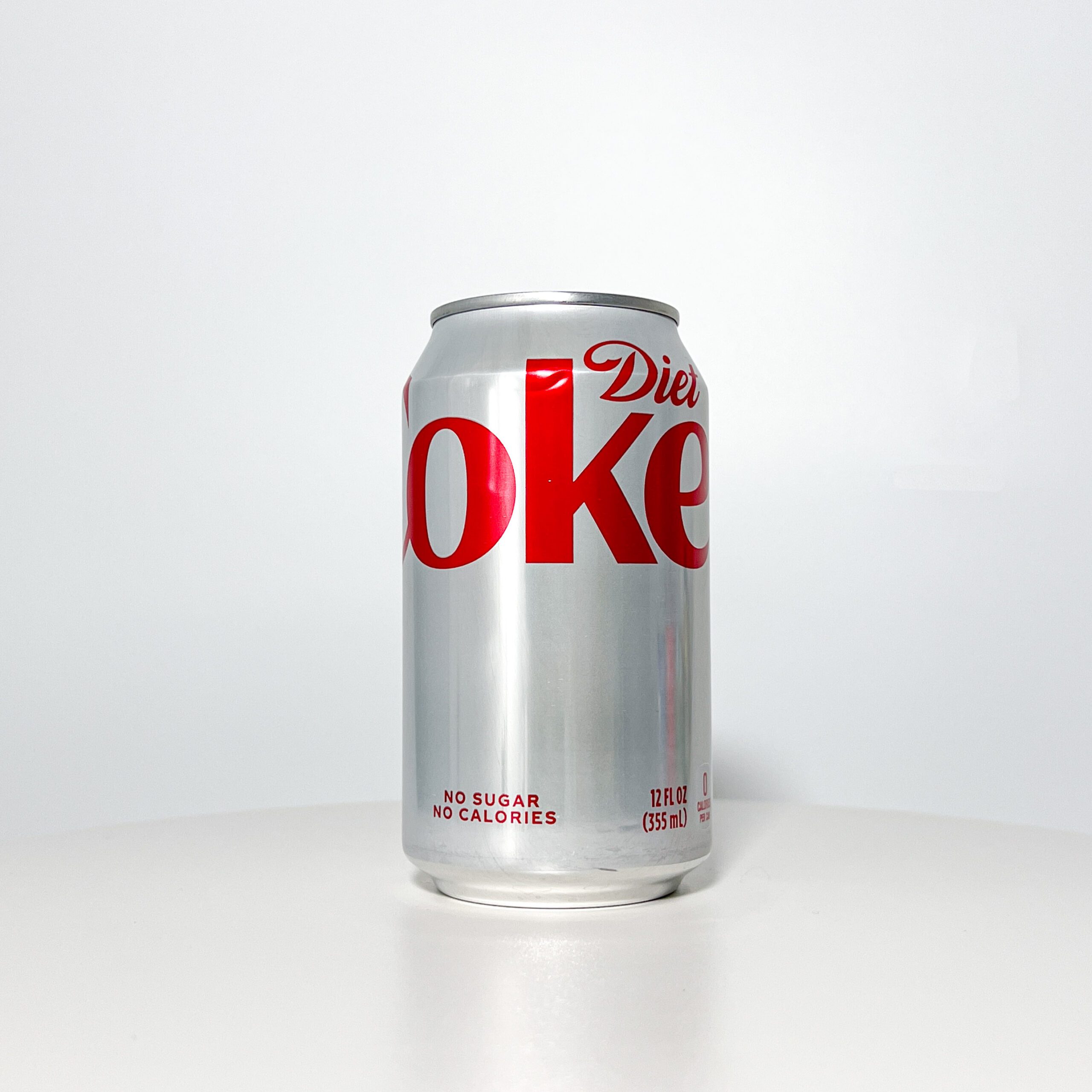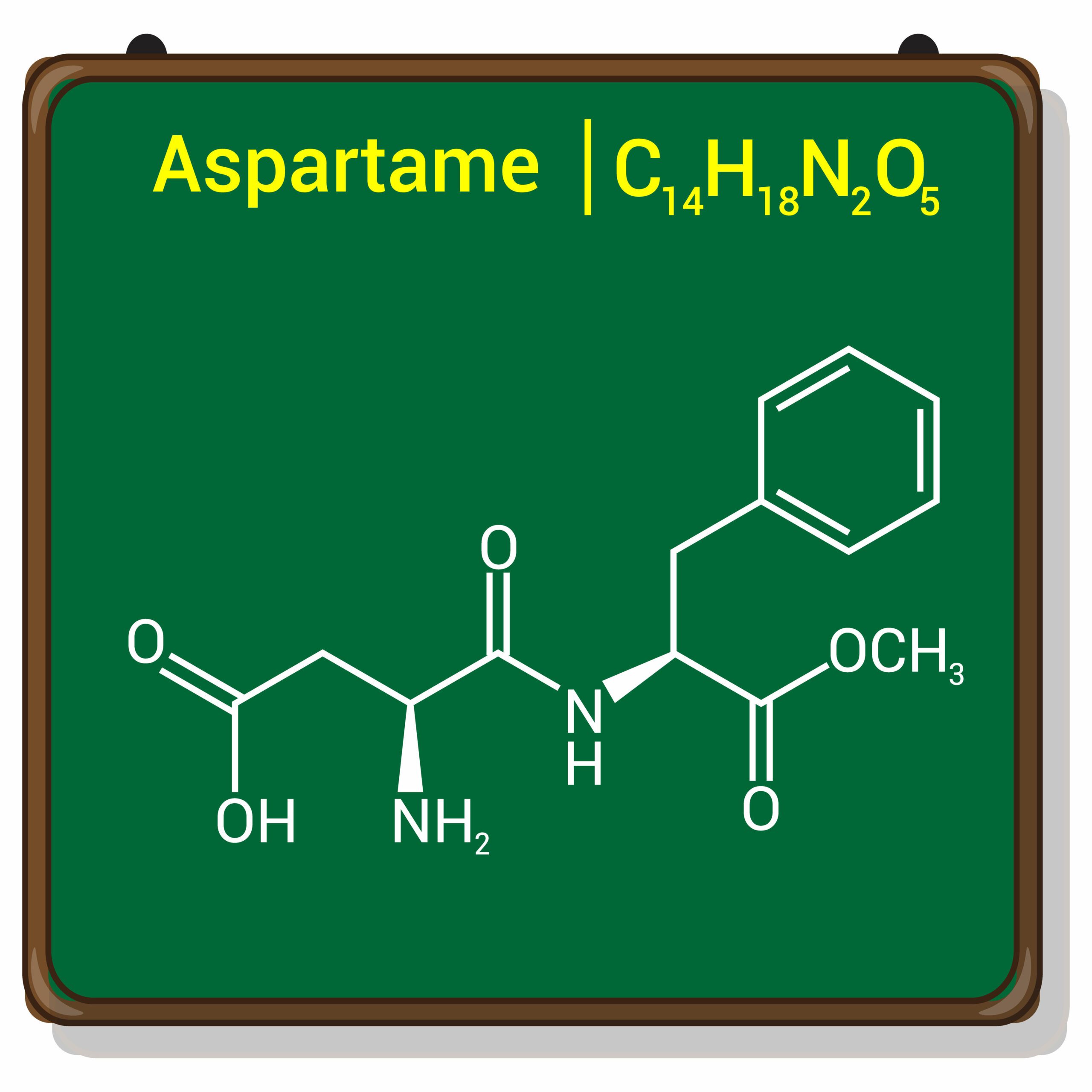Coke Vs. Diet Coke: The Untold Truth About Aspartame
July 7, 2023
 1262
1262 
Written By: Jack Riess NASM Certified Personal Trainer and Life Long Researcher of Health and Longevity.
In the great arena of soda pop, there has always been a fierce competition: regular soda versus its diet counterpart.
Each can has sparked countless discussions and debates, with a particular spotlight on the world-renowned Coca-Cola, or as it’s affectionately known, Coke.
Is Diet Coke, with its alluring promise of zero calories and sugar, truly a healthier alternative to its original, full-sugar sibling?
We’ve all been there, staring down the supermarket aisle, contemplating between the iconic red label or the silver-trimmed one, a decision often influenced by our quest to reduce sugar intake, cut down on calories, or follow the latest dietary recommendations.
The Diet Coke can, with its ‘zero sugar, zero calories’ pledge, often seems to have a halo of health around it, seducing weight watchers and health-conscious consumers into its grasp.
However, a recently released study may have us all rethinking our choices.
This report sends a startling wave through our long-held beliefs: Aspartame, the artificial sweetener that gives Diet Coke its sweetness without the calories, might be a possible carcinogen.
As shocking as it sounds, it’s a conversation we need to delve deeper into, for the sake of our health and the choices we make.
The Basics: Coke and Diet Coke

The beloved Coca-Cola, an emblem of American culture and global consumerism, is more than a century old.
Its classic recipe is a blend of carbonated water, high fructose corn syrup, caramel color, phosphoric acid, natural flavors, and caffeine.
A single 12-ounce can of regular Coke packs about 140 calories and a hefty 39 grams of sugar, which equates to about 9 1/3 teaspoons.
On the other side, its sleeker relative, Diet Coke, boasts a different ingredient list.
Along with carbonated water, it contains caramel color, aspartame, phosphoric acid, potassium benzoate, natural flavors, citric acid, and caffeine.
Its crowning glory, however, is that it delivers the familiar Coke taste for zero calories and zero sugar – a feat accomplished with the help of aspartame.
Aspartame, a low-calorie artificial sweetener, is about 200 times sweeter than sugar, meaning a little goes a long way.
Its use in Diet Coke and other diet beverages allows these drinks to maintain their sweetness while ditching the caloric content of sugar.
This sugar-free, calorie-free proposition has long been perceived as a healthier alternative, especially beneficial for those monitoring their sugar intake or counting calories.
But is this ‘healthier’ alternative as innocent as it appears?
With the new studies surfacing, it’s high time we took a more discerning look at what we’re sipping on.
Our understanding of these drinks, their ingredients, and their impacts on our health may be about to take a significant turn.
Aspartame: The Key Differing Ingredient

Aspartame first graced the food industry in the early 1980s, paving the way for a new era of low-calorie, sugar-free alternatives that promised the sweetness of sugar without the guilt or health risks.
Hailed as a miraculous solution to the growing concern over sugar intake, aspartame became a mainstay in many diet drinks, including Diet Coke.
But what is aspartame, and how does it work its sugar-free magic?
Aspartame is a low-calorie artificial sweetener, composed of two amino acids – phenylalanine and aspartic acid, along with a small amount of methanol.
When we consume aspartame, our body breaks it down into these components, which are then absorbed and processed.
Despite being artificial, the amino acids in aspartame are the same as those found in everyday foods like meat and dairy.
For years, numerous studies have been conducted to assess the safety of aspartame, given its widespread use.
The consensus, up until recently, has been that aspartame is safe for most people, with regulatory bodies like the FDA, European Food Safety Authority (EFSA), and the World Health Organization affirming this stance.
There have been considerations regarding individuals with phenylketonuria, a rare inherited disorder who can’t metabolize phenylalanine, but for the general population, aspartame has been seen as a safe sugar substitute.
The Turning Point: New Studies on Aspartame

Yet, like any good plot twist, new research is challenging the long-standing narrative.
A recent report leaked and subsequently published in the New York Post delves into the potential carcinogenic effects of aspartame, turning heads and raising eyebrows in scientific and consumer circles alike.
The researchers involved in this study undertook a comprehensive review and analysis of existing scientific literature and data on aspartame.
Their findings indicated that there might be a potential link between aspartame consumption and an increased risk of certain types of cancers, throwing into question decades of safety endorsements for this popular artificial sweetener.
Compared to previous studies, this new report carries significant weight due to its exhaustive review of past research.
By amalgamating data from a multitude of studies, the researchers could observe potential patterns and associations that might not be visible in individual studies.
Consequently, the implication of aspartame as a possible carcinogen seems more substantial than ever.
However, it’s essential to remember that a correlation does not prove causation.
While the new research does raise concerns, it doesn’t definitively establish aspartame as a carcinogen.
What it does do is highlight the need for more comprehensive and rigorous investigations into the long-term effects of aspartame on human health.
In the wake of this revelation, it’s time to reassess our understanding of Diet Coke, its key ingredients, and the possible health implications.
As the curtain pulls back to reveal a more complex picture, one thing becomes abundantly clear: there’s far more to Diet Coke than meets the eye.
The Impact: Diet Coke and Your Health

In light of these new findings, the ‘Diet’ in Diet Coke might not be as healthful as it once seemed.
The revelation about aspartame’s potential carcinogenic risks could profoundly reshape our perspective on Diet Coke and other similar artificially sweetened drinks.
What was once perceived as a guilt-free alternative may now carry an asterisk of caution.
Potential health risks related to long-term Diet Coke consumption cannot be ignored, especially considering the frequency with which many people consume diet sodas.
The artificial sweetener that seemed harmless may be associated with increased cancer risks, opening up a whole new conversation about the ‘diet’ choices we make.
However, it’s essential to walk the fine line between causation and correlation.
While there appears to be an association between aspartame consumption and certain types of cancers, it doesn’t necessarily imply causation.
Other factors could be at play, warranting a nuanced understanding of these complex interactions.
The Bigger Picture: Artificial Sweeteners and Public Health

These findings about aspartame have far-reaching implications, extending beyond personal health choices.
They underscore the broader conversation about the role of artificial sweeteners in our food and beverage industry.
Will this provoke a reevaluation of artificial sweeteners’ usage and a move towards more natural alternatives?
The role of regulatory bodies like the FDA becomes paramount in such a scenario.
It is their responsibility to reassess aspartame’s safety and adjust public health recommendations accordingly.
As consumers, we rely on their assessments to guide our decisions.
In such a complex narrative, transparency and public awareness are critical.
Consumers deserve to be well-informed about the potential impacts of the products they consume.
Now You Know the Truth!

As we’ve traversed the journey from the iconic red-labeled Coke to the silver-trimmed Diet Coke, it’s evident that the conversation isn’t as simple as calories and sugar content.
The recent study bringing aspartame’s safety under scrutiny adds a new dimension to this debate, challenging our long-held beliefs about ‘diet’ alternatives.
As we move forward, it’s essential to make informed choices, considering not just calories and sugars, but also the quality of the ingredients in our beverages.
We need to remember that health isn’t merely about diet drinks or sugar-free alternatives; it’s about balanced, mindful consumption.
Lastly, the importance of ongoing research cannot be overstated.
As science advances, we must stay open to evolving understandings, always ready to question, learn, and adapt.
So the next time you find yourself deciding between a Coke and a Diet Coke, remember: there’s more to that can than meets the eye.

A new study suggests that a widely used sugar substitute found in diet sodas, chewing gum, and low-sugar yogurt may elevate insulin levels. This could increase the long-term risk of heart disease. “Artificial sweeteners have infiltrated nearly all types of food, making it crucial to understand their long-term health effects,” said Yihai Cao, senior author […]

Diet Coke has long been a fan-favorite among soda lovers who want a fizzy, guilt-free alternative to traditional soft drinks. While its zero-calorie, zero-sugar label makes it seem like a healthier option, the reality is far more concerning. Despite its undeniable popularity, Diet Coke’s nutritional profile has raised red flags among health experts for years. […]

New study shows that embracing an anti-inflammatory, plant-forward diet can support cognitive function and help reduce the risk of dementia. What You Eat Shapes Your Brain The food you eat doesn’t just impact your body—it also affects your brain. Research suggests that eating an anti-inflammatory, plant-based diet can help improve memory, focus, and overall brain […]